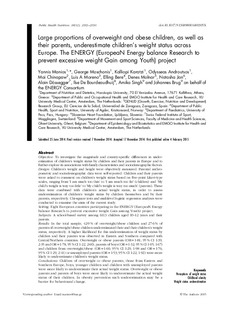| dc.description.abstract | Objective: To investigate the magnitude and country-specific differences in under- estimation of children’s weight status by children and their parents in Europe and to further explore its associations with family characteristics and sociodemographic factors. Design: Children’s weight and height were objectively measured. Parental anthro- pometric and sociodemographic data were self-reported. Children and their parents were asked to comment on children’s weight status based on five-point Likert-type scales, ranging from ‘I am much too thin’ to ‘I am much too fat’ (children) and ‘My child’s weight is way too little’ to ‘My child’s weight is way too much’ (parents). These data were combined with children’s actual weight status, in order to assess underestimation of children’s weight status by children themselves and by their parents, respectively. Chi-square tests and multilevel logistic regression analyses were conducted to examine the aims of the current study.
Setting: Eight European countries participating in the ENERGY (EuropeaN Energy balance Research to prevent excessive weight Gain among Youth) project. Subjects: A school-based survey among 6113 children aged 10–12 years and their parents.
Results: In the total sample, 42·9% of overweight/obese children and 27·6% of parents of overweight/obese children underestimated their and their children’s weight status, respectively. A higher likelihood for this underestimation of weight status by children and their parents was observed in Eastern and Southern compared with Central/Northern countries. Overweight or obese parents (OR=1·81; 95% CI 1·39, 2·35 and OR = 1·78, 95 % CI 1·22, 2·60), parents of boys (OR = 1·32; 95 % CI 1·05, 1·67) and children from overweight/obese (OR=1·60; 95% CI 1·29, 1·98 and OR=1·76; 95 % CI 1·29, 2·41) or unemployed parents (OR = 1·53; 95 % CI 1·22, 1·92) were more likely to underestimate children’s weight status.
Conclusions: Children of overweight or obese parents, those from Eastern and Southern Europe, boys, younger children and children with unemployed parents were more likely to underestimate their actual weight status. Overweight or obese parents and parents of boys were more likely to underestimate the actual weight status of their children. In obesity prevention such underestimation may be a barrier for behavioural change. | nb_NO |
